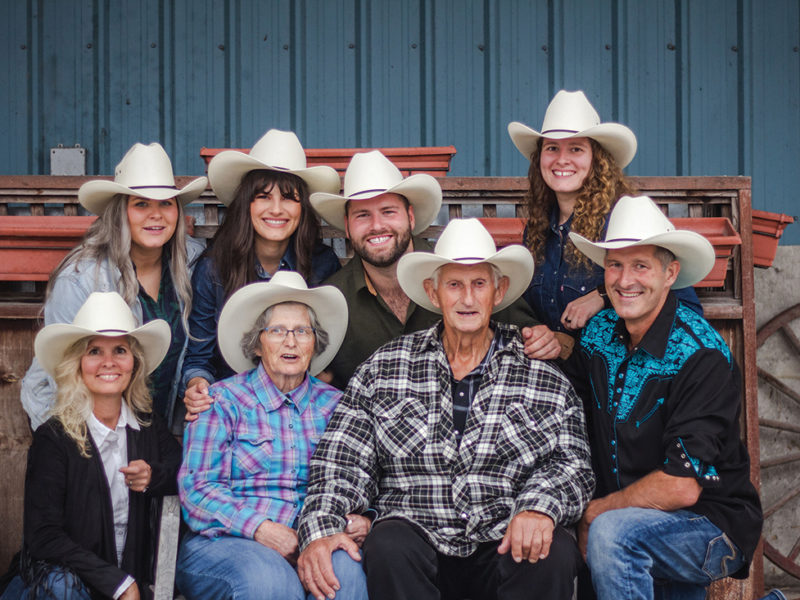PITT MEADOWS – Severinski Farms reached a golden milestone this fall, one recognized with the province’s Century Farm and Ranch Award.
The celebration in September was attended by nearly 200 people, including friends, family and local politicians. It was a special moment for the entire family, but especially Harry and Louise Severinski, who have been a part of the operation for the lion’s share of its 100 years.
“I told my parents, so they knew (the barbeque) was happening, but we hadn’t told them we’d applied for the BC Century Farm Award and we didn’t tell them we’d invited all the local politicians,” says Kevin Severinski, Harry and Louise’s son and a third-generation farmer. “So, they were pretty shocked when they saw the mayor, councillors, the MLA and MP show up. They were pretty proud.”
The Severinski family traces its farming roots back to 1910 when Steven Severinski, Kevin’s grandfather, immigrated from what is today Croatia. Upon landing in Cloverdale, Steven bought a five-acre parcel and invited his fiancé Manda to join him. The couple married on
September 12, 1921, just a day after she arrived. They milked about a dozen cows and established Severinski Farms.
When a neighbour’s farm caught on fire in early 1922, the Severinskis joined a bucket brigade to put out the fire and save the neighbour’s house. But the strain caused Manda, who was expecting the couple’s first child, to miscarry and she wound up in hospital.
During Manda’s week-long hospital stay, Steven swapped the Cloverdale property for 40 acres in Pitt Meadows. When he picked Manda up following her treatment, they drove to their new farm just north of the Fraser River, along with all their cattle and one horse. The couple bought two more draft horses upon their arrival.
As Steven and Manda settled into their new home, they grew their land base to 80 acres and their family by 10 children.
Harry, the couple’s youngest son, bought the farm in 1965. He and his wife Louise expanded the operation to 120 acres and 60 milking cows.
In 2000, Kevin and his wife Audra took over the farm. They have since grown the operation to 145 acres of owned land and 100 acres of leased land. Kevin has worked on the farm all his life. He took an off-farm job for a year after high school, but quickly came back home because he “really enjoyed the lifestyle.”
“With dairy, it’s a lot because you have to milk every day,” he says. “(But) it’s nice to have variety – you have field work, mechanic work, a lot of construction and there’s other types of maintenance.”
The farm also provided a rich environment in which to raise their four children. So much so, that two of their children are interested in carrying the farm into its fourth generation.
Their son Brandon is the family’s full-time herdsman. Their daughter Amanda is a herd manager and works off the farm in sales.
As the family navigates the challenges of succession planning with four children, they hope the operation’s legacy will continue long into the future.
The family now milks 160 cows three times a day with a herringbone double-eight parlour.
“I always wanted to milk three times a day. I worked with my dad forever and over the last four or five years we worked together, I told him I wanted to milk three times a day,” Kevin says. “He said the day I bought the farm, I could milk as many times as I wanted. Purposefully, the day we bought the farm, we started milking three times a day and have ever since.”
The Severinskis grow grass crops for the cattle, producing silage and small square bales.
Throughout the years, the family has integrated innovative and technological advancements into their operation, such as cattle pedometers and milk meters.
“We have a computer system that keeps track of milk weights and cow activity three times a day and breeding (information) is all in there,” Kevin says.
In addition to innovation, collaboration and understanding between the generations contribute to the farm’s long-term success.
“It’s very special, the fact that I get to work with my dad every day. I think it’s even more special that my dad gets to work with his grandson,” Kevin says. Harry and Brandon clean the heifer and calf barns together three or four times a week.
“My dad drives the tractor and my son moves gates. I always think about how lucky Brandon is to have those experiences. My dad shows Brandon a lot of mechanics stuff, too, and shows him how to fix equipment. My grandfather was 90 when I was 12. He was retired by then.”
Through the family’s 100 years of farming, other operations came and went, but the Severinskis stayed true to their passion – cows – and their community.
“We’ve never switched to blueberries or cranberries,” says Kevin. “A lot of people moved around or did chickens. We’ve always just stuck with dairy for 100 years. And we love Pitt Meadows. We’re very involved in the community in a lot of local events.”


 Dairy compensation fund opens
Dairy compensation fund opens